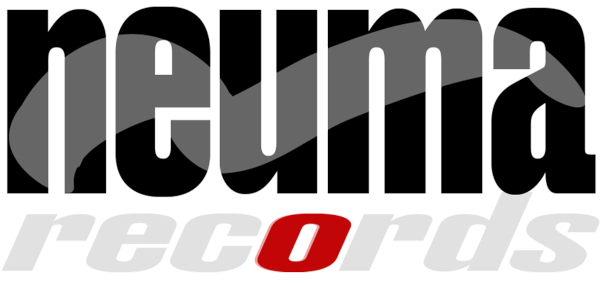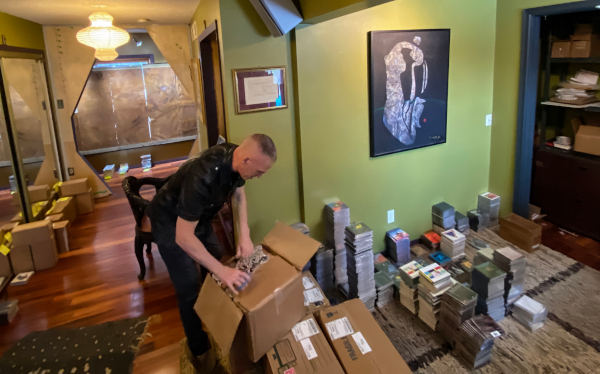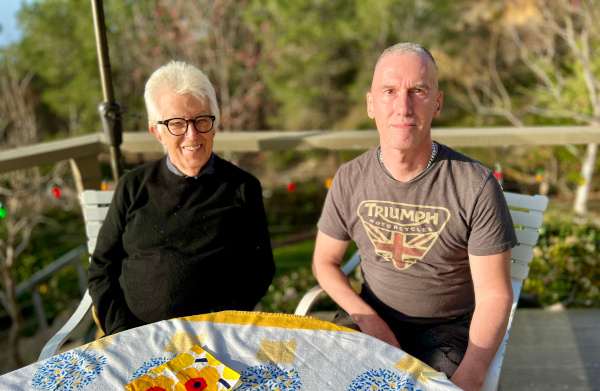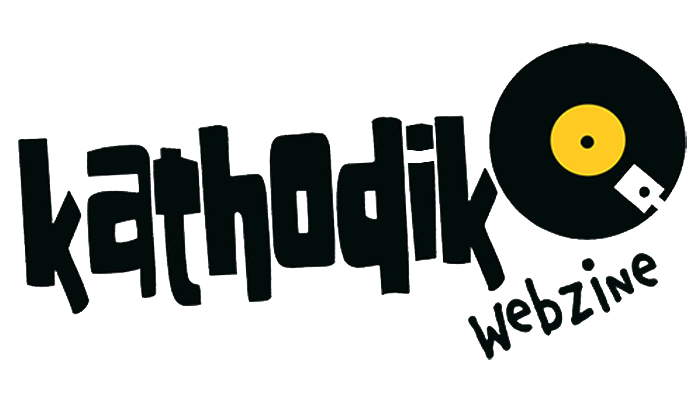
Neuma is an American record label that has attracted the attention of Kathodik’s editors and readers for a few years now, and that has quickly become attuned to the musical coordinates usually found in our digital pages. The label has been dedicated for many years to the discovery and appreciation of contemporary classical and electroacoustic music, thanks to the work of its current director Philip Blackburn, an old acquaintance of Kathodik who previously worked at Innova Recordings, which is another interesting label that you were able to learn more about in one of our previous interviews (here). As usual, after many listening experiences I decided that it was time to learn more about Neuma and the philosophy that drives it, so I decided, along with Filippo Focosi, to interview Philip Blackburn and ask him the following questions, about the past, the present, and, most importantly, the future of this truly experimental label.
Here you can find the Italian Translation
How did the idea of founding Neuma Records come about in 1988? What circumstances, even practical ones, made the birth of the label possible? And what prompted you, Philip Blackburn, to decide to relaunch the label in 2020?
(photo in home: Philip Blackburn at Orfield Labs) The origin of the label was before my era so I asked OG Roger Reynolds for his story about the Neumagenesis:
“In the 1980s, Shirish Korde was a faculty member at Holy Cross College, in Worcester, Massachusetts. As his residence was inconveniently distant from Boston, the nearest city, he decided to establish a small record label as his metaphoric “gate” to the larger musical world. Through the medium of shortwave radio he kept track of developments in European music that he found of interest (Xenakis, Saariaho, Risset, Ferrari, etc.). He ordered scores from European publishers and then forged agreements with such composers whose work was not easily available in the States at that time. I thought this was a particularly enterprising way of being a useful and well-informed member of the musical world then. He included American composers of interest and I came to know him quite well and a number of my works were released first on Neuma. The label has continued – under the energetic leadership of Philip Blackburn – Korde’s original ecumenical but carefully curated ways since its earliest days in Western Mass.”
Fast forward to 2020. I was contacted by Jerry Tabor who had been managing Neuma for some years, and he was looking to transfer the label to an entity that would cherish and keep the titles available as a legacy going forward. After almost 30 years at the Innova Recordings label, and seismic shifts at our parent organization, the American Composers Forum, I was ready for change and felt I had the industry experience to start my own label but instead Neuma – with its distinguished history of top shelf talent – fell into my lap. As luck would have it, Neuma and I found each other around the same time, and thanks to the pandemic, I could spend some time rebuilding its infrastructure from scratch. I had been through something similar in the early days of Innova (since 1991 I had helped the catalog grow from a dozen to around 600 titles) and having worked on every aspect of production, distribution, and promotion (albeit with team support and an endowment) I found new ways to manage every aspect of the business by myself. Without that experience in the field and a community of supportive artists (Roger Reynolds, David Dunn, Warren Burt, Tom DeLio among them), I think the learning curve and relaunch would have been much harder. It’s a niche endeavor after all.
For the first year I was not only building the back end but also planning releases that might make a splash and encourage other artists to notice and follow suit. From Robert Moran, Harry Partch, and Kenneth Gaburo to the Afro Yaqui Music Collective and Pamela Z, the releases started to get notice and it has snowballed ever since.

Your productions, while focusing on the so-called contemporary classical music (mainly from the American area), also encompass world and electroacoustic music. Why did you decide to concentrate upon such musical styles (rather than, e.g., upon Baroque, jazz, or ambient music)? Do you think that they are more representative of contemporary sensibility, or is it just the fact that you find them more attractive as compared to other genres?
I’ve released some neo-Baroque, jazz-like, and luscious ambient music too! Also Indigenous Garifuna music from Belize. But it’s not really about the styles. It depends on what people send me, that meets the broad quality criteria, and feels like something I can confidently add value to through Neuma’s expanding networks. Electroacoustic music is at the core of Neuma’s history and seems to me like a logical extension of the Experimental Classical tradition; it all comes down to artist- rather than market-driven music. If my networks of media contacts for airplay and reviews seems like a good fit for a project, and I think I can add enough visibility for a release to justify the costs, then why not? Artists have plenty of options these days (as well as the greater risk of getting lost in the glut of product) so I want to make sure each release gets its best shot at reaching a wider audience than they could do by themselves. Charles Ives published his own work, Harry Partch had Gate 5, and Kenneth Gaburo had Lingua Press; I see a useful role for an artist-centric effort that expands the reach of otherwise non-commercial work.
While I love trumpeting new works hot off the press, I also see a need for ensuring that legacies are not neglected. Some of these significant artists include Robert Paredes, Otto Laske, David Dunn, and Robert Moran and I hope gathering their discographies in one place will make it easy for future generations to discover them.
Your catalogue also include what you call“experimental classics”: I’m thinking, for instance, of some of Neuma’s recent releases which feature the works of such composers as Ives, Cage, Tudor, Partch, Roger Reynolds, or William Duckworth. What does the word“experimental” mean to you?
For me, it means that the vision carries as much weight as the craft. Is your goal to add to the existing musical yardage or do you have something more original to say that potentially disrupts our musical assumptions and forces us to listen with fresh ears? Is it more than a demonstration of the technology? Does it represent a music in search of a society or the other way around? Are you a corn-fed radical? I am perfectly content to give a platform for the beauty of “irrelevant” music and ignore what marketing focus groups might advise.
I expect every artist feels they are making something new to them, but from my perspective as a voracious listener, I am drawn to audacious work that gives me new thoughts about the very idea of music. Something so ground-breaking that we can never listen in the same way again. Something that is not merely new wine in old bottles but a completely different beverage (and container)! Even better is when I learn of radical ideas in music that have an emotional impact; something for the head, heart, and even feet. If the music is non trivial, non redundant, and is a mature example of the artist’s personal voice, then you have me hooked. Maybe it was easier back in the day to rebel against the conservative orthodoxy of the early twentieth century (Ives, Cage, Partch, and others stepped outside and developed their own musical worlds at risk of being roundly ignored). Now, partly thanks to them, we have fewer stuffed shirts and way more acceptance of different paths. That said, I adhere to the Blackburn Constant which states that 85% of anything is unremarkable; 10% can be taken seriously; and 5% is exceptional. I want to toot the latter’s horn.

There is, in the United States of America, a considerable amount of record labels dedicated to the enhancement of contemporary music written mainly (albeit not exclusively) by American composers (think of, e.g., New World, Cantaloupe, Cold Blue, Navona, and so on). What do you think is your most distinguishing trait – if there is any – with respect to these other labels?
Labels used to be the gatekeepers for access to the distribution system and some have a mission to promote a certain organization, approach, identity, or repertoire. Each has different strengths and different business models to stay afloat. All are having to redefine themselves in this era of self-releasing when artists may not even see the advantages of being on a label. If Neuma has a brand I would say it advocates for respecting and caring about the artist’s creative direction, helping them reach the highest standards (from the look, sound, and marketing perspectives), helping them put their best foot forward throughout the arcane and bewildering publishing process, and ensuring their work ripples out to the widest circles of those interested in such things. From the end user’s perspective, I can promise it will be “food for the mind’s ear.”
Do you think that music, among many other things, has the capacity to change, at least in a small part, the life of people? How important is the – so to say – “human” quality of the music you produce? (I would suggest Richard Carr’s Landscapes and Lamentations as a good example of what I mean with such terms)
In 1979, when I was 16, I entered a classroom at San Diego State University where the Harry Partch Ensemble was in final preparations for The Bewitched and their first trip abroad (to the Berlin Festival). The rest of my life has been catching up with the people and ideas I met in that room on that day. They included Kenneth Gaburo (who became my composition teacher), David Dunn, Bob Paredes, Jon Szanto, Danlee Mitchell; and the expanding connections from them: Warren Burt, Chris Mann, Pauline Oliveros, Harley Gaber, Eleanor Hovda, Henry Brant, and many, many more. I immediately went home to Oxford and built a Quadrangularis Reversum in my shed and was never the same again. The wheel has even come full circle now I have been able to release the binaural recording of that live show in Berlin. In the 43(!) intervening years I would say my life has demonstrably been changed by the power of music and I would only wish that for everyone else too.
The richly eloquent language of Richard Carr’s music goes to show that there is nothing to be afraid of in a well-turned melody, imaginatively and gorgeously performed. You wouldn’t be the first to cry at Robert Moran’s heart-wrenching harmonies, Ros Bandt’s epic visions, or Lawson and Merrill’s ambient dreamscapes. Whether smooth or crunchy, just remain suspicious of music that is “better than it sounds.” That’s one attitude that can finally wither on the academic vine.
Among the many composers and musicians that are featured in your extensive catalogue, are there some ones to whom you are particularly attached or who are most representative of your (so to say) musical/artistic mission?
Of course, after spending 20 years with the Harry Partch archives and producing the Enclosures series of book, DVDs, and CDs, I admire his independent spirit in forging a creative life, as well as how inextricably linked his biography is with his output (the relationship of the ‘maker’ and the ‘made’ always fascinate me). My own path as an environmental sound artist and composer resonates with eco-friendly Neuma artists such as Mihailo Trandafilovski, Glen Whitehead, Jane Rigler, Eleanor Hovda, Pauline Oliveros, and David Dunn. I’m a sucker for ambient complexity.

Neuma Records productions are exclusively in CD and digital format. What do you think about vinyl? Do you think it will find some space in your label in a not too distant future?
It has already found a place in my storage cabinet (for a couple of titles by Glen Whitehead and Tyler Kline) but it moves slowly and hurts my back. My nostalgia for vinyl (and appreciation for surface noise) is narrower than the hundreds of obscure old albums I still have from the first time around, but I can certainly help artists produce it if they think they have the right demographic. I will admit, the act of purposefully placing a disc on a record player and admiring what comes out for the next 20 minutes (39’ for La Monte Young) is a deeper act of listening than earbuds while jogging. Apart from that, the cost, timeline, mailability, and carting factors far outweigh the pleasure of holding a big arty sleeve in your hand. CDs have changed meaning in recent years (they are a glorified business card to some extent) but they are still a step up from “out of sight, out of mind” streaming services and contain richer information about the music than a digital provider’s interface would have you believe (especially how the Classical genre is displayed).
Do you have some direct relations with conservatories and universities for your record productions? Have you ever being supported, in some way, by the US government, or do you rely mainly on private funding?
Neuma has no connection with outside funders and relies solely on artists covering production costs. Neither do we rely on sales income to stay in business (that way madness lies). While we recognize financial barriers are burdensome, we try and keep the costs reasonable and, given enough projects over the course of a year, can keep the ship afloat that way. Some artists are lucky enough to have institutional support for their publications but we are not affiliated with anyone. Perhaps we can raise donations for a Neuma Assistance Fund in the future to help reduce the financial outlay for needy artists.
Do you think that social media may help the promotion of contemporary music? How does the label act on social media?
For better or worse, everything is findable social media. While that is better than being isolated from the tribe, it can also be overwhelming. Neuma tries to be active everywhere that people might be looking: X, Facebook, Instagram, Soundcloud, Bandcamp, Youtube, even Mastodon and Audius (but not Threads yet). We have followers on all platforms and welcome every potential entry point. But a lot of effort also goes into expanding the networks through servicing media (hundreds of specialty radio shows around the world and reviewers/bloggers for new music). They have their own circles and followers too. And there’s always the direct email newsletter that goes out to 2000+ customers around the world each month. That PR role in itself is something a label can do that individuals can’t by themselves.

How do you imagine the future of contemporary music, especially from the point of view of record labels such as yours? Could you tell us something about some of your future projects?
Music is unstoppable and easier than ever to make and share. The forces at play in the commercial world (how to get on Spotify playlists, how to generate Youtube or TikTok videos, how to buy Likes) are only going to multiply. They are playing a different game though, monetizing eyeballs and soundbites. The value of a label such as Neuma is in its careful curation (remember that 5%?), putting the artists and their vision above commercial intent (luckily expectations of financial returns are low these days), soup-to-nuts production services, and providing a welcoming home for singular, exceptional, musical philosophers, not to say creative misfits.
As Neuma finds its feet and hits its stride, artists (and audiences) are steadily finding their way to the label and the release schedule is primed for months ahead. Some names include: Ed Campion, Otto Laske, Patrick Quinn, Jon Christopher Nelson, Linda Dusman, Catherine Schieve, Robert Carl (including Robert Black’s last recording), Douglas Ewart-Christian Asplund-Steve Ricks Trio, Drew Whiting (Pamela Z, Ed Martin, Yaz Lancaster, John Mayrose), PAN Project Ensemble, Jeremy Beck, Thomas Ciufo, Michael Schumacher, Peter Van Zandt Lane, Sarah Gen Burghart Rice, Bryan Hayslett (Joan La Barbara, Caroline Shaw, Judith Weir, Brent Michael Davids, Mary Kouyoumdjian, and Anthony R. Green), Philip Blackburn (ORDO, a big retrospective with an all-star cast), and many more including some household names I am not at liberty to reveal…. If you are ready for some audacious listening, you could do worse than give Neuma a try.
Link: Neuma Records Home Page
Link: Neuma Records Facebook Page
Link: Neuma Records Twitter Profile
Link: Neuma Records Instagram Profile
